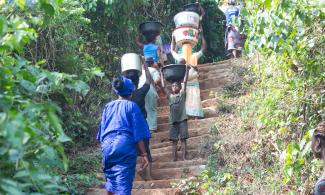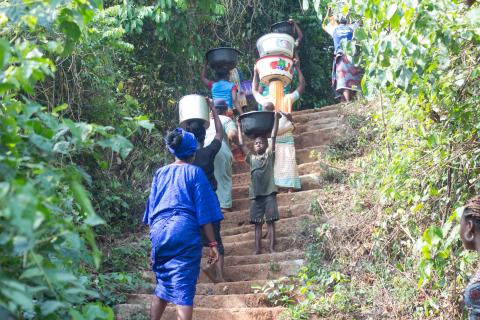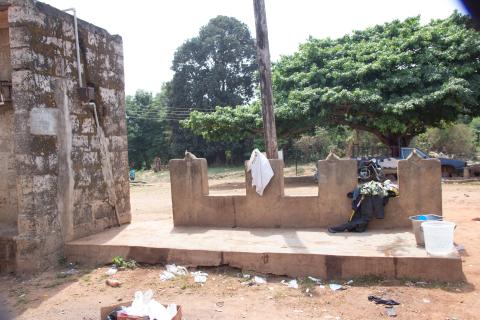
The women and children in Idoka are responsible for fetching water for their families as they do not have access to water on premises. On average, they have to travel for about 3 kilometers (to and fro), which is approximately 20 minutes to fetch 25 litres of water at a time.

Washing your hands regularly is one of the first things that public health officials in Nigeria and the World Health Organization have recommended to prevent the spread of COVID-19.
Globally, access to water is a recurring challenge to millions of people where an estimated 40 percent of the global population is faced with water scarcity.
In Nigeria, about 63 million people or 33 percent of the population do not have access to improved sources of drinking water and only about 42% of households in rural areas have access to safe water. This presents a major challenge to the citizens and public health officials particularly at this time with the COVID19 pandemic.
Women and girls bear the burden of collecting water for domestic and household use. Indeed, in Nigeria, there is a total of 68.2 percent of households without drinking water on premises and 80 percent of the households without access to water across the globe depend on the back-breaking chore that women and girls have to do every single day. In Nigeria, adult women constitute 40% and female children under age 15 constitute 11% of those responsible to provide water for their families.
This lack of access to water and sanitation in Nigeria remains a major contributing factor to high morbidity and mortality rates among children under five. The United Nations Children’s Fund, UNICEF has confirmed that the use of contaminated drinking water and poor sanitary conditions result in increased vulnerability to water-borne diseases, including diarrhea which leads to deaths of more than 70,000 children under five annually.
Nigeria and Demographic Health Survey in 2018 revealed that 41.6percent of the rural households access water from unimproved sources like unprotected dug well, unprotected spring, surface water and sachet water. It also revealed that 65.8 % rural households use 30 minutes or less to access water outside premises for a round trip. With the added threat of the COVID19 virus, women and girls have to bear the additional burden of making numerous trips just for the household to have adequate supplies of water for hand washing.
Delay in accessing safe water, apart from the health implications also threaten the livelihoods of smallholder farmers, and contributes to low levels of school enrollment, especially among girls who have to fetch water for their families. Women with disabilities in rural communities are also more challenged with double barriers to accessing water, for instance, a physically challenged woman who uses a walking aide or a blind person who uses guide cane and a deaf woman who cannot communicate with others without the use of sign language interpreter are unable to get water easily like women without disabilities.
Idoka Community Facing the Challenges of Water
While numerous rural communities across the country are being faced with water challenges, residents of Idoka community of Obokun Local Government area of Osun State also have their fair share in accessing drinking water.
Idoka has a population of about 3,200 with women and children constituting the huge proportion of about 2,400. The community has three main access entrances; one through Ilowa (on the East) another through Iregun (from the North) and the last through Ibala (from the West). Those living around the entrance from Ilowa constitute the larger part of the community and it is called, ‘Oke-Ode’.
The Palace is located around the Eastern part of the community and a bit close to the Northern entrance which makes it quite far from those in Oke-Ode but the palace is not too far from the other entry from Ibala.
The women and children in Idoka are responsible for fetching water for their families as they do not have access to water on premises. On average, they have to travel for about 3 kilometers (to and fro) which is approximately 20 minutes to fetch 25 litres of water at a time. For any individual who wants to fill her 100-litre drum or water reservoir at home, she is required to do at least five trips daily which is equivalent to two hours daily. Owing to the COVID-19 Pandemic, women would need to embark on more trips, at least 7, to make water available for all members of the family to observe regular handwashing.
This combined with other household chores and business may also cause some economic loss on a daily basis.
In addition to the long distance they have to cover, they also have to climb hills before they could fetch drinking water from the only source within the community.

Popularly called ‘Omi Oko’, the only source of drinking water in Idoka community also serves three other neighbouring communities; Iregun, Idominasi and Ilowa, especially during dry season.
While scooping the water, women and children have to be extremely careful to ensure they do not scoop up the soil and other sediments which mix with the water. And when it does, they have no choice than to collect the water as it is and allow the sediment to settle before it can be ready for drinking.
Some of the women who due to old age and ill-health cannot climb the hill have to allow the younger women and children fetch drinking water for them or engage the services of those who would fetch the water but at a fee.
Majority of the women and girls prefer to collect their water from ‘Omi Oko’ instead of any other water source within the community, as they believe it has some ancestral relevance to the community and it has been in existence for a very long time. It is also the only water source that does not have a ‘taste’ in the community.
The residents believed that other water sources within the community, some of which are no longer functional, have sour taste and could not ascertain the cause of the contamination due to lack of technical capacity to understand and address the water challenges.
Despite the satisfaction they derive in drinking from ‘Omi Oko’, the time spent on collecting the water has an impact on their source of income as they have less time to spend on their farm work or other businesses.
Chief Mrs. Deborah Adebisi, the YeyeRisa of Idoka Community explained that fetching water from ‘Omi Oko’ is a difficult task for all and unfortunately that is the only source of drinking water within the community except for sachet water. Not everyone can afford to buy sachet water whose quality has also been found to be sketchy.
Chief Mrs. Adejoke Obileye, YeyeRangun of Idoka Community said pregnant women and nursing mothers faced exceptional challenges as they find it difficult to climb the hill after fetching water. Elderly women who cannot climb the bill with their jerricans of water have to depend on their children to fetch or are forced to pay for people to fetch the water for their daily needs.
Mrs. Agbola Comfort, a nurse in Idoka Primary Health Care Center who is also a resident in the area confirmed the residents preference for the Omi Oko water source and said this was because there has never been an outbreak of waterborne disease in the community.
She said, “Omi Oko is the only drinking water in this community and it doesn’t affect the residents in any way, the only challenge with the water is the stress the women go through to fetch it.
“Nowadays, the old women no longer go there because it is affecting their health, so they would rather send their children to fetch the water for them, little do they know that it would soon affect the health of those young children too.”
On the sidelines of COVID-19, Nurse Agbola believes the residents need to adhere strictly to the recommendations from the WHO and State’s Ministry of Health in combating the virus. She added that residents should not disregard the fact that there is no confirmed case in Osun yet, but should take all necessary precautions.
A corps member serving in the community, Omeke Ikechukwu, said himself and other corps members in the community buy sachet water to drink as they could neither go to the stream nor drink from the well which is close to their residence. Omeke believed he would have been able to save more from his monthly allowance if he didn’t have to buy sachet water for drinking purposes.
Previous Interventions

Previous interventions to make water accessible for all within the community were described as either insufficient, inappropriate or inaccessible. The community in 2003 after the ‘Idoka Day’ Celebration used the funds generated to build boreholes in 3 strategic locations within the community but they are no longer functional as some of the wells are already dried up or the taps completely spoiled.

The African Development Bank, Federal Government of Nigeria and Osun State Government Hand Pump water project in 2018 which is situated close to the palace is a bit far from people at the other side of the community and residents consider it a bit difficult to pump the water.
In the face of the current COVID-19 pandemic, residents are still perplexed on what to do to make water available within the community to ensure they observe the regular hand washing recommendations by WHO.

The community seems not to have resources to provide water bowers or repair the spoiled boreholes to improve their access to water, especially with the current crisis of COVID-19.
Recommendations
The women in the community who are saddled with the responsibilities of providing water for their families believe that adequate and sufficient intervention should be provided to make drinking water available and accessible to all.
It is evident that residents of Idoka community in Ibokun Local Government Area of Osun State encounter some sort of difficulties in accessing safe, clean and potable water. And with the recent declaration of COVID-19 as pandemic and recommendations by the World Health Organization on the need to observe regular handwashing, residents of Idoka are more vulnerable because of the challenges they face to access water on a regular basis coupled with getting more water to observe handwashing.
In reaction to the pandemic and poor water facilities across the country, Deputy Executive Director, Environmental Rights Action / Friends of the Earth, Nigeria, ERA/FoEN, Akinbode Oluwafemi said: “As Nigeria’s Covid-19 confirmed cases continue to grow, this year’s World Water day is a wakeup call to government at all levels paying lip-service to the water sector to work the talk.
“We are being told to wash our hands with water and soap when the taps in our communities are all dry. Most of our communities lack water for consumption and for basic hygiene and this makes checking public health emergencies much more difficult.
Possible interventions to make water available within Idoka community, most importantly for the purpose of regular hand washing, community leaders should as a matter of urgency, include buying water from neighbouring towns; Osogbo or Ilesa.
This is essential because it would be difficult for the women to walk such a long distance to fetch drinking water and use it for hand washing, they might be reluctant and in turn be infected if adequate precautions are not followed.
As such, the water bought from neighbouring towns can be stored in a reservoir and located in strategic places within the community.
If the community cannot afford it, it would be imperative for the government, either at State or local level, to provide an alternative source of water for the purpose of preventing the pandemic.
For a permanent way of resolving the challenges faced in accessing water, the Obokun Local Government and Osun State Government should provide boreholes with taps in strategic locations within the community. As such, water is made available for all and whoever prefers to drink from Omi Oko because of their ancestral linkage would do so at will and not out of compulsion.
Also, to ensure the attainment of Sustainable Development Goal 6 which seeks to achieve safe and affordable drinking water for all by 2030, there is a need to consider rural communities in all interventions to be provided by the government at all levels.
Watch a video documentary on how women in Idoka access water on a daily basis.
This story was supported by Code for Africa via it’s Wanadata Community Initiative